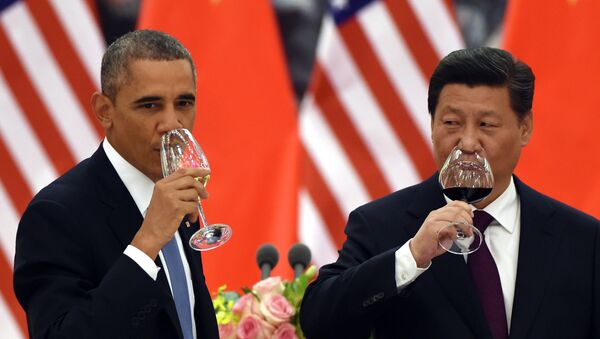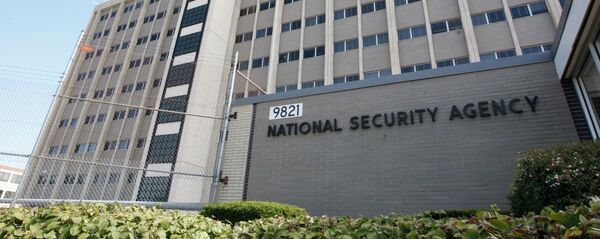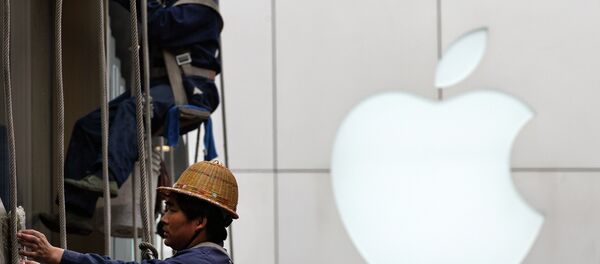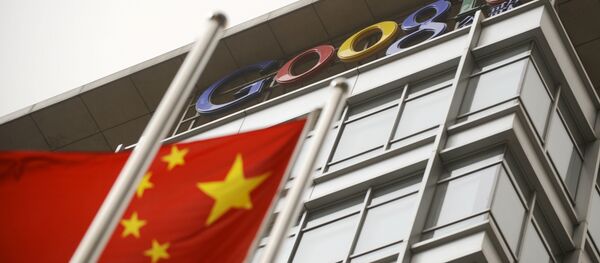Last Monday, the US stock market saw its most dramatic intraday swing in history. After plunging 1,098 points, the Dow Jones managed to settle down at 585, but not without causing a small financial panic. Fairly or not, much of the blame was placed on a lack of confidence in the Chinese economy.
"Obviously, what we have is a structural problem over China," market analyst Patrick L. Young told Sputnik. "The Chinese markets have been deteriorating for some weeks now. So what we are seeing is a global market scenario…"
If Monday’s global financial waver taught us one thing, it’s that world markets – the US’ and China’s, in particular – are hopelessly entangled.
But despite that affirmation, the Obama administration is reportedly considering the implementation of economic sanctions against Beijing. It’s as if Washington doesn’t realize that any damage done to the Chinese economy will have an inevitable negative effect on US markets. What’s even more baffling is that Washington is punishing Beijing for crimes it cannot prove.
Hypocritical Sanctions: A Song We’ve Heard Before
The relationship between the United States and China has seen better days. A number of disagreements – including rising tensions in the South China Sea – have put the Obama administration at odds with Chinese President Xi Jinping.
Xi’s visit to Washington next month, the first in his role as president, offered some hope that the two leaders could mend ties. But new sanctions ostensibly aimed at punishing China over industrial espionage could derail any negotiations.
Especially since the implementation may deliberately coincide with Xi’s visit.
"Let’s be honest, I can see the White House saying, 'Let’s not do [sanctions] while the head of state is here,'" one White House official, speaking anonymously, told the Washington Post. "I can see maybe they’d shift the timing by a few days…but I can’t imagine they’d shift the overall decision."
The sanctions would target individuals and entities associated with commercial espionage. Officially, the decision has nothing to do with the massive hack into the US Office of Personnel Management earlier this year which, without citing any evidence, the government blamed on China. But senior US officials told the Post that the data breach was "judged as having been carried out for traditional intelligence purposes – not to benefit Chinese industry."
Still, those same officials acknowledged that the accusations against Beijing helped solidify support for economic sanctions.
But even Washington’s official reasons for targeting China come across as hypocritical, at best. While the Obama administration accuses Beijing of stealing industrial secrets to benefit its own economy – charges unproven and vehemently denied by the Chinese government – America’s own role in cyber-economic espionage has been well documented.
In June, WikiLeaks unveiled reports that proved the US National Security Agency’s role in eavesdropping on foreign companies. This included spying on every major French company, despite the fact that France is one of America’s major allies.
"The United States not only uses the results of the this spying itself, but swaps these intercepts with the United Kingdom," WikiLeaks founder Julian Assange wrote.
The reports were later verified by revelations of the NSA’s surveillance of former German Chancellor Gerhard Schroeder.
"The US government routinely claims that it doesn’t spy for economic reasons, yet it usually finds 'strategic' reasons to get the same information," J.J. Steinberg, a senior editor with the Executive Intelligence Review, told Sputnik.
The NSA was also found to be guilty of spying on foreign governments by installing trap doors in US-based companies. This plan – essentially using tech giants like Apple as digital Trojan horses – prompted the Chinese government to pass counterterrorism legislation, granted Beijing NSA-like access to private data.
Of course, the international example set by the NSA is only one instance of US actions ultimately coming back to harm US industry.
Biting the Hand That Feeds
In 2010, Google was involved in a heated row with the Chinese government. Confronted with a choice between operating in China by Beijing’s rules, or withdrawing from the market altogether, the tech giant initially stood firm.
But so did the Chinese government, and only a few months later, Google, one of the most influential and broad-reaching companies on Earth, caved.
The lesson: China does not back down when faced with obstacles from abroad.
Many experts critical of the Obama administration’s sanctions proposals have pointed to the likelihood of Chinese counter-sanctions.
"I’d say the chances of Chinese retaliation are high," Jeffrey A. Bader, a former advisor to President Obama, told the Post.
There’s also the fact that a number of US companies rely heavily on consumers in the Chinese market. Apple, for one, saw a major growth in sales during its most recent quarter. Revenue in China grew to $13.2 billion, an increase of 112% from the previous year. That’s almost $3 billion higher than Apple’s sales in Europe.
With that kind of reliance on China, US-based companies can’t afford to become embroiled in a trade war launched by the Obama administration. Especially given that Apple’s sales have already suffered in the fallout of the NSA’s spying operations. And Apple isn’t the only one.
"We have previously acknowledged that geopolitical concerns have impacted our business in certain emerging markets," a spokesman for Cisco Systems told Reuters in February.
While a final decision has not yet been made, US State Department spokesman Mark Toner said that the use of sanctions "remains a tool in the proverbial toolbox…but I am not saying we are moving forward in that direction."
President Xi’s visit next month will feature a large State Dinner organized by the White House. With the Obama administration prepared to launch a full-scale trade war, it could be a very awkward meal.







